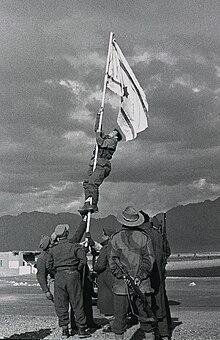In a region steeped in decades of political turmoil, the longstanding “Arab-Israeli conflict” has been a pervasive phrase, evoking images of unrest, violence, and deep-seated animosity. However, as the complexities of the Middle East continue to evolve and shift, some are questioning whether it is time to retire this often oversimplified and divisive term. Let us delve into the nuances of this multifaceted issue and explore the possibility of a more nuanced and inclusive narrative.
Challenging the Narrative: Reconsidering the Term ‘Arab-Israeli Conflict’
Is it time to reconsider the term ‘Arab-Israeli conflict’? As the decades-old dispute continues to evolve and shift, some are questioning the usefulness and accuracy of this traditional label. Rather than framing the issue as a binary conflict between Arabs and Israelis, perhaps it is time to acknowledge the complexity and nuance of the situation.
By retiring the term ‘Arab-Israeli conflict,’ we can pave the way for more inclusive and accurate discussions surrounding the various parties involved. This shift in language could help foster a deeper understanding of the roots of the conflict and open up new possibilities for peaceful resolution. It is essential to challenge the existing narrative and embrace a more nuanced approach to tackling this long-standing issue.
Moving Towards Inclusive Terminology: Addressing Diversity in the Israeli-Palestinian Conflict
In recent years, there has been a growing shift towards using more inclusive terminology when discussing the conflict between Israelis and Palestinians. The term ‘Arab-Israeli conflict’ has long been used to describe the ongoing tensions and violence in the region. However, many believe that this label is outdated and fails to account for the diversity of perspectives and experiences within both communities. As we strive for a more nuanced understanding of the complexities of the Israeli-Palestinian conflict, it may be time to retire the term ‘Arab-Israeli conflict’ in favor of more inclusive language.
By moving towards more inclusive terminology, we acknowledge the diverse identities and narratives that exist within the Israeli and Palestinian communities. This shift can help to humanize the individuals involved in the conflict and foster greater empathy and understanding. Embracing a language that reflects the complexity of the situation can open up new opportunities for dialogue and reconciliation. As we work towards a more peaceful future in the region, it is important to consider the impact that our words and language choices can have on shaping perceptions and building bridges between different groups.
Promoting Accuracy and Sensitivity: Rethinking Language Surrounding Middle East Politics
In recent years, there has been a growing conversation around the language used to describe the complex and nuanced political dynamics in the Middle East. One term that has come under scrutiny is the phrase ‘Arab-Israeli conflict’. Critics argue that this term oversimplifies a deeply intricate situation, reducing the conflict to a binary narrative that erases the experiences and perspectives of many groups involved.
As we strive for greater accuracy and sensitivity in our discourse surrounding Middle East politics, it may be time to retire the term ’Arab-Israeli conflict’ in favor of more inclusive and nuanced language. By using terms that reflect the diverse range of voices and experiences in the region, we can give proper recognition to the complexity of the situation and avoid perpetuating harmful stereotypes and generalizations. It is essential to acknowledge the multifaceted nature of the conflict and the various historical, cultural, and political factors at play.
To Conclude
As we navigate through the complex web of geopolitics and cultural dynamics in the Middle East, perhaps it is time to reevaluate our terminology and approach to discussing the tensions between Arab countries and Israel. By retiring the outdated label of the “Arab-Israeli conflict” and embracing a more nuanced and inclusive perspective, we may find new pathways to reconciliation and understanding. It is crucial to acknowledge the diverse voices and histories at play in the region and strive towards a more just and peaceful future for all who call it home. Let us continue to engage in meaningful dialogue and pave the way for a more harmonious coexistence in this ever-evolving landscape.
